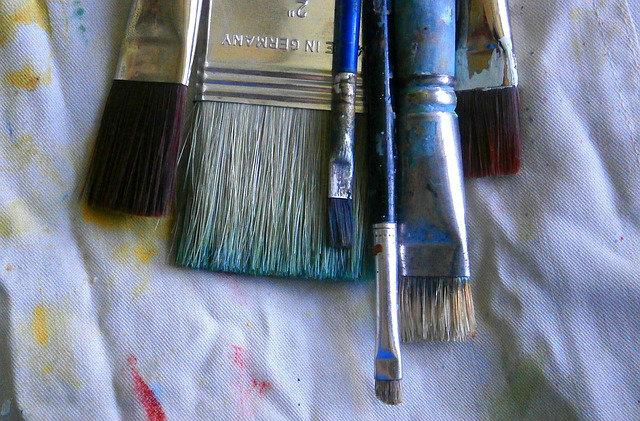
Recently, I came across this short article, Your Body Is Not Your Masterpiece.
“Stop spending all day obsessing, cursing, perfecting your body like it’s all you’ve got to offer the world,” Glennon Doyle Melton wrote in the piece. “Your body is not your offering. It’s just a really amazing instrument, which you can use to create your offering each day. Don’t curse your paintbrush. Don’t sit in a corner wishing you had a different paintbrush. You’re wasting time,” she wrote.
I read it, and then read it again, and then thought about it for a few days. I love the message, but I think it would be a mistake to read this and take it as a license to abandon taking care of your body.
It’s true. Your body is not your masterpiece. Fighting against your body, and obsessing about achieving a perfect shape is madness. It will drive you crazy. It will irritate those around you and make you a tedious companion.
However, focusing on your health, on moving your body and filling it with nutritious food, is a worthwhile pursuit.
Your body is not your masterpiece — but your health is.
Why Your Health Matters
In my twenties, I worked out almost entirely to change the shape of my paintbrush. I put on my gym clothes and tied my shoes fueled only by a desire to look better. It was just by accident I discovered the joy of learning a sport, first with boxing, then surfing and CrossFit.
Now I’m 43. While I still love learning new skills and I’m addicted to how regular exercise and healthy eating makes me feel, I’ve started to think more about the impact of these habits on my long-term health.

A few weeks ago, I was stuck in an urgent care waiting room with my eight-year-old son, who had a stomach pain we thought might be appendicitis. (Thankfully, it wasn’t.)
While we were waiting, a woman who looked to be in her eighties came out from the examining rooms into the waiting room — pushed in a wheelchair by a nurse over to the woman’s husband. The three conferred about the woman’s health, the medications she needed to take, and how she was feeling. She had fallen and hurt herself, and was in a considerable amount of pain. After the conversation was over, she sighed.
“Getting old is a pain in the tush,” she said loudly, half to her husband and half to all of us in the room. Overhearing that conversation, I felt so grateful for my health and for the freedom to experience the joy of physical movement. I know eventually I’ll start to slow down and things will begin to ache, but I’m trying my best to delay that process as long as possible.
Staying healthy will not completely prevent the effects of aging, of course. But it can help. “Research shows that many of the changes attributed to aging are actually caused in large part by disuse,” reported Harvard Medical School in 2009.
This year, a study published in the journal Neurology showed physical activity can slow brain aging by up to ten years, while other studies demonstrated the potential of exercise to improve cognitive function and even prevent dementia.
Waking up every day and exercising with the hope you might transform yourself into a different person is a frustrating task. I find it much easier, and more inspiring, to think about how my consistent good health habits will benefit me for years to come. It’s not about everyday perfection and impossible standards, it’s about living a vibrant, healthy life for as long as possible.

How to Focus on Your Health
If you’re having trouble taking the long view with regard to your health and fitness, here are some tips.
1. Don’t get sucked in to nutrition fads or quick fixes.
A week or two of perfect eating will do nothing for your long-term health. This is why the Whole Life Challenge is focused on changes you can sustain for weeks, months, and years. There will always be some new superfood or meal plan that promises the moon, but if you can’t follow a diet consistently, it won’t have any long-term impact on your life. When you expect unrealistic weight-loss goals, you set yourself up for failure. Instead, think of each day as a chance to improve your health. And every day you eat well and move is a success.
2. Move outside the gym.
I am an admitted gym rat. I’m in the gym every Monday, Tuesday, Wednesday, and Friday at noon, like clockwork. I’ve been known to schedule appointments around my workout routine, I love it that much. I also understand the concept of too much of a good thing.
The gym is not real life, and there’s so much more to health and fitness than how I perform at my CrossFit class. That’s why I surf on Thursdays and many Sundays, and keep Saturday open to do some kind of activity with my kids, or maybe even nothing at all. It’s in those moments outside of the gym that I can most strongly feel the effect of my fitness habit—when I swim in the ocean with my daughter or bike around the neighborhood with my son.

3. Remember your between-the-ears health.
Exercise is good for your brain, but it’s also important to keep the mind healthy and stimulated in other ways. For me, the challenge is not to occupy my mind but to calm it. I’m an over-thinker, a planner, and a worrier. These characteristics help me in some ways. I’m good at keeping my kids’ schedules straight and thinking ahead to what everyone needs to get through the day and the week. My over-thinking also helps me come up with article ideas and to think deeply about what I write.
However, all this thinking has a dark side. My mind spins about the silliest things. I imagine disastrous outcomes and get anxious about things that are ultimately meaningless. Meditation is the only thing I’ve found that calms my brain and trains me to slow down and focus on the present moment. I find it harder to make myself meditate than to go to the gym, but I keep working on incorporating it in my day, and I find I’m happier and calmer when I do.
Your Health Is Your Masterpiece
As you participate in this Whole Life Challenge, keep your eye on the long view. It’s not about fighting against and hating your paintbrush, but creating a masterpiece you can enjoy for years to come.



